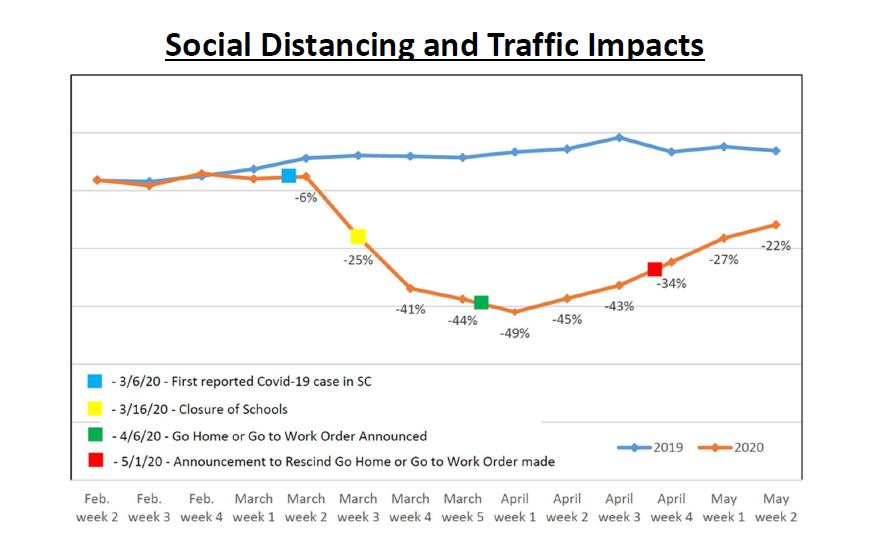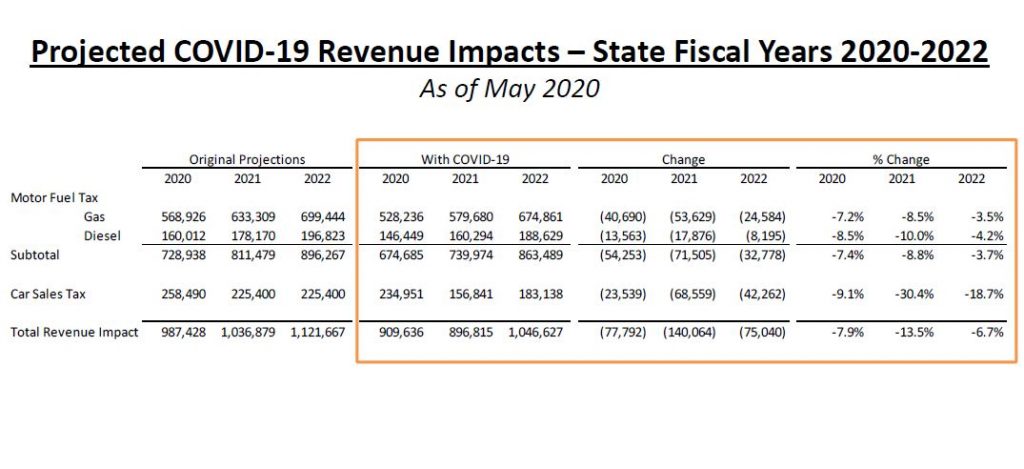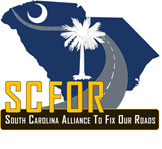The SCDOT Commission met Thursday at the USC Alumni Center to allow for social distancing between Commissioners and SCDOT staff. The meeting was streamed online for the public to watch. This was the first Commission meeting since February, so in addition to typical business, Commissioners were able to get a thorough update from SCDOT staff on the impacts of COVID-19 on the agency.
Traffic volume is a key indicator of revenue trends, and, like many other states, South Carolina saw a significant drop in April. The chart below indicates the impacts that various closures/orders had on traffic volumes across the state. As you can see, traffic volumes continue to trend upward as the state slowly begins to reopen.

Source: COVID-19 Presentation to SCDOT Commission 5/21/2020
In some cases, some areas are now experiencing normal or above-average traffic volumes.
• Most interstates are now trending 80-85% of normal volumes.
• Non-interstate routes in urban areas (midlands/upstate) are near normal levels.
• Coastal areas are experiencing dramatic increases in traffic.
Decreases and delays in revenues are inevitable, given the reduction in traffic volumes over the past two months and filing extensions granted by state agencies.
Delays will stem from deferrals and grace periods established by the SC Department of Revenue (DOR) and the SC Department of Motor Vehicles (DMV) for remittance of certain revenues and fees. These extensions through June and July will interrupt cash flow for 2-3 months and will limit visibility to revenue streams.
Currently, the impacts of the state’s primary revenue sources on the current fiscal year is estimated to be a reduction of $78 Million:
• Fuel taxes – $54 million
• Infrastructure Maintenance Fee (formerly the car sales tax) – $24 million
If the overall economic recovery is drawn out, South Carolina could be looking at a $140 million reduction in FY2020-2021 and $75 million in FY2021-2022.

Source: COVID-19 Presentation to the Commission 5/21/2020
To help “flatten the cash curve” and ensure that core operations and road and bridge projects can continue, SCDOT has implemented measures to reduce internal operating expenses.
The SCDOT plans to continue work as planned, and May, June, and July lettings will not be affected. Moving forward, projects will be paced with revenue receipts.
COVID-19 has wreaked havoc on every aspect of the economy. Despite the fact that South Carolina has been able to keep road and bridge projects going over the past two months, infrastructure is not immune to the impacts of this virus. South Carolina joins 49 other states who are all seeing impacts on transportation revenues due to COVID-19.
While the duration and true impacts remain unknown, SCFOR will continue to follow the financial impacts and projections. Roads and bridges keep our economy moving; therefore, they will play a critical role in the state’s economic recovery.

